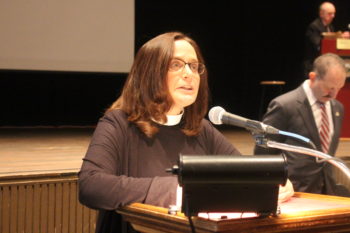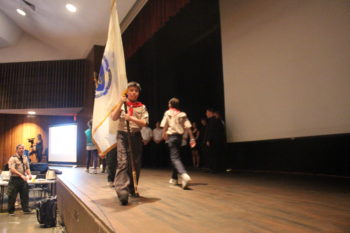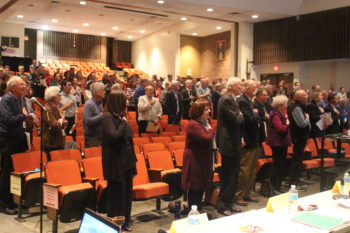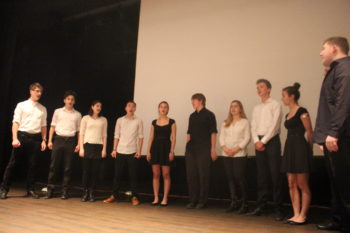Photo: Town Moderator Mike Widmer.
Welcome to the final night of the 2017 Belmont Town Meeting.
After speeding through the first half of the financial articles on Monday, June 5, Belmont’s annual Town Meeting will only have seven articles remaining on this year’s warrant.
7:09 p.m.: Running a bit late but the meeting has started with the Pledge of Allegiance.
7:18 p.m.: Kathy Keohane, chair of the Library Trustees, is delivering a short report on the feasibility study for a new Belmont Public Library. The report is here. Why does the town need a new library? Because it’s so well loved and used. There is a demand for library services and a new 38,000 sq.-foot building is needed. It will cost about $24 million for new construction which is the most efficient and cost effective. Private fundraising will be an important component of the financing of the new building.
7:27 p.m.: State Sen. Will Brownsberger is giving a report on making a few predictions. He said Belmont will still receive the local aid that has been estimated earlier this year by the legislature despite the fall-off in revenue. Brownsberger said there will be more congestion on roads and mass transit. He’s still concerned about changing local zoning laws to increase affordable housing types which died in the legislature. He’s working hard on mitigating aircraft noise over Belmont.
7:39 p.m.: Now off to the articles. Article 18 will establish a special education reserve fund to pay for unbudgeted costs associated with out-of-district tuition and transportation costs. Belmont School Superintendent John Phelan said this new account is different than the existing Stabilization Fund? Basically, it allows easier access to funds where the school committee doesn’t have to wait until June, it just means a favorable vote from the Board of Selectmen and the School Committee. Jim Gammill, Pct. 2 and Warrant Committee member, who is in favor of the account said he doesn’t want to zero out the existing fund, rather keep about half of it where it is which will allow for policy discussion on SPED costs before the entire town. Phelan said he is only asking to establish the account this year with funding to be decided at next year’s Town Meeting. The article is approved with a few no votes/
7:59 p.m.: Now the budget, article 13.
- General government, $4.6 million – approved.
- Employee benefits, retirement expenses, $7.3 million – approved.
- Employee benefits, other reserves such as health insurance, $3.0 million – approved.
- Public safety, $14.3 million – approved.
The school budget is now on the table, at $52.97 million. Phelan said he is “proud” to present this year’s budget. You can read the report here. The budget is on track to be balanced at the end of the fiscal year, “which is not always the case.” Challenges are enrollment projections and per pupil expenditures. Belmont spends $13,400 per student vs. the state with $15,500 and peer groups (level 1 districts and nearby towns) at $18,000, more than a third more. All the while enrollment is climbing by nearly 500 students by the 2024-25 school year. Personnel and space are needed. Phelan give a shout out to parent groups and the Foundation for Belmont Education. Gammill reads from the Warrant Committee report on the schools and comes up with an interesting fact: the town is likely paying too much for teacher salaries than peer communities. This issue could come back in future negotiations with the teacher’s union which is coming soon.
Sue Bass, Pct 3, wonders what’s happening with later opening times for high school students. “I’m willing to pay for the schools but not if the students are sleeping the first two classes.” It could happen by Sept. 2018. Chris Doyle, Pct. 1, asked if any impact from Federal government funding with the new Trump administration which many believe will lower education funds in the coming years. Phelan said only $1.4 million comes from federal funds with $921,000 directed to SPED accounts. She also said the deficit on student spending vs. peer communities is “not sustainable.” Selectman Mark Paolillo speaks of the several financial deficits facing the town including paying for a high school.
Klaus Becker, Pct. 5, said the Gates Foundation found it’s not class size but high-quality teachers to have great outcomes. While he does agree with the idea, Phelan said size does matter to efficient teaching. Deb Lockett, Pct. 7, said “it’s startling” to see the cost-per-student deficit with other towns, that we are in a pit that we can’t get out. Lockett asked should the town/schools have a grant writer. Paolillo said while you can have a grant writer, it’s better to see if there is a different way to fund services. Steve Rosales, Pct. 8, said there is always a need for more money, but that doesn’t relate to the quality of the education. “It isn’t about money.” Anne Mahon, Pct. 4, said it is about the money, that people are coming to the town for education which you can’t do without paying for it.
The vote is taken and the $52.97 million budget is approved.
9:16 p.m.: Town Moderator Mike Widmer said it will likely take two hours to finish the budget. UGH! And it’s starting to get really cool inside the auditorium.
- Funding for the Minuteman Regional School, $910,185 – approved.
- Public Service, $13.4 million – approved.
- Human Services, $3.2 million – approved.
- Debt and Interest on the debt, $4.5 million – approved.
Now the transfer of balances being read by Town Treasurer Floyd Carman. All approved.
This ends the budget.
9:24 p.m.: Now the citizen’s petition to transfer $1 million from free cash – the town’s piggy bank – into the General Stabilization Fund which was established after the 2015 Prop. 2 1/2 override which will then have $4 million. Petitioner Bob Sarno, Pct. 3, said this is a simple request, a fiscally prudent choice, as it will help delay the need for an override with town deficits rising in the next few years. While it will take a higher percentage (2/3 rather than the current simple majority) of town meeting members to approve the use of the $1 million as it’s in a stabilization fund, Sarno said any worthy expenses will be OK’d by the members.
Both the selectmen and the Warrant Committee voted “unfavorable” action.
Selectman Adam Dash said keeping the money in free cash will make it easier for the town to use the funds as it will need a simple majority rather than a 2/3 vote, especially since the money may be used to purchase much-needed modular structures.
Selectman Adam Dash said keeping the money in free cash will make it easier for the town to use the funds as it will need a simple majority rather than a 2/3 vote, especially since the money may be used to purchase much-needed modular structures in the fall. Selectman Chair Jim Williams said he is opposed to funding any capital expenditure with free cash – it should be bonded.
Both Selectman Paolillo and Treasurer Carman said while they support the idea, the time is not right to pass it. Wait until the October/November Special Town Meeting to realize the cost of the modular structures or some other issue. Several town meeting members voiced in favor of the petition all suggesting that it makes sense to place funds in reserve.
The motion was moved and the vote is taken. And it is adopted, 109 to 102.
9:55 p.m.: The final four articles are related to retirement issues: you can read the report here. The changes are made possible by local option from the state legislature, which the town’s Retirement Board brought forward to Town Meeting. Article 20 seeks to increase the cost-of-living-allowance base for 339 town retirees from $12,000 to $14,000 which turns out to be $35 a month/$420 a year. It will have the largest impact on the retirement liability of the four retirement articles, adding $235,150 to the fiscal 2019 budget and adding $1.7 million to the unfunded liability “and that’s a big climb to get out of” said Dash. “This is not small money we are talking about.” “We are meeting our legal obligation” if the town says put, said Bob McLaughlin, Pct. 2. It’s an issue of balance, said McLaughlin, and we don’t have the money.
Jack Weis, Pct. 1, said the town needs to find a way to fund the two percent increase in the COLA as the town has an obligation to provide for retirees. Warrant Committee Chair Roy Epstein, said the COLA is a local option, it’s not a requirement; plenty of other well-funded towns are staying at $12,000. The higher expense of $235,000 to the town budget will have to come out of some other line item.
The vote is being taken – and it fails 69 to 126. That was a surprise.
10:42 p.m.: Now up is Article 19, to increase the stipend to the Retirement Board up to $4,500 from $3,000. Apparently, since they are fiduciaries and other new responsibilities set forth by the legislature, the retirement board believed it was appropriate to bring this local option to Town Meeting. The Selectmen voted 3-0 for favorable action while the Warrant Committee voted unfavorable action 9-1. McLaughlin said while the Retirement Board does a great job, so does the School Committee and the other 66 boards in town who don’t get paid. The vote is taken and its 22-164 in the negative.
10:58 p.m.: Final two articles! Article 21 effects four spouses of employees who died while working by increasing the monthly benefit from $250 to $500 which will increase the 2019 budget by $13,805. Dash said he’s against the article on principal. Lubein said it’s a small amount of money and a unique case. Rachel Berger, Pct. 2, said workers do die young and it will help those who may have lost a breadwinner. The vote is taken and the article is approved 124 to 52.
11:04 p.m.: Here we go, the final article. Number 22, to increase the annual allowance of retirees who stopped working due to accidents or disability from $6,000 to $12,000. Only three retirees are effected with a small pool. It will take a bite out of the budget for $20,000 each year. The vote is taken – 60 in favor, 117 opposed.
And at 11:11 p.m., the annual Town Meeting is closed!





